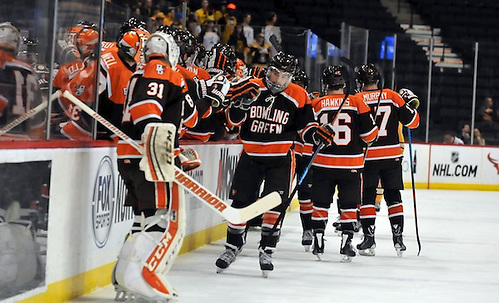
There have been some rumblings around college hockey about how the ability for schools to provide a stipend beyond a scholarship to cover the full cost of attendance will affect the landscape.
In reality, it’s probably too soon to tell how much of a change that will be, but we’re starting to get a sense of how widespread the utilization will be.
Of the 60 schools playing Division I men’s college hockey this upcoming season, 50 give athletic scholarships that now can be supplemented with the stipend to cover things beyond tuition, books, and room and board.
According to an anonymous survey coordinated earlier this month by Joe Bertagna, the American Hockey Coaches Association executive director and Hockey East commissioner, 22 schools were planning to provide the cost-of-attendance supplement in the 2015-16 season.
That’s just more than the 21 schools that said they weren’t planning to give the aid, while seven hadn’t yet made a final decision.
The gap between what schools provide as a full scholarship and the total cost of attendance has been estimated at between $2,000 and $5,000, with the cost higher at some schools because of differences in cost-of-living and travel expenses. For sports like hockey that also offer partial scholarships, the schools can decide how much of a stipend to give to those who don’t get a full grant-in-aid.
One could view the change as another way to separate the financial haves and have-nots in college hockey. Yet some say it’s not going to be that big of an alteration to what already goes on in the sport, with the bigger schools by and large having more resources than the smaller ones.
Some around college hockey have said it will be a definite recruiting advantage for those who offer the stipend over those who don’t. It’s not hard to imagine that being the case in a recruiting game that already has its unsavory points.
One coach mentioned that there are stories going around of the existence of the stipend at one school being a difference-maker in a player’s recruitment.
The Big Ten and the other “Power 5” autonomy conferences (Boston College of the ACC and Arizona State of the Pac-12 are the other men’s college hockey schools involved) passed the full-cost-of-attendance measure in January, leaving adoption beyond their borders up to individual conferences.
Last month, the WCHA’s board of directors voted to support the addition of stipends, pushing the decision onto individual schools. The league had the option to limit the amount of money schools can spend on the stipend, which would have impacted the full Division I schools — Bowling Green on the men’s side and Minnesota, North Dakota, Ohio State and Wisconsin on the women’s side. For hockey, they would have been bound by what the WCHA dictated, not what the school’s multi-sport conference said.
Schools that are mainly in Division II or III but play in Division I for hockey can offer the stipends, and it’s clear from the numbers that some will.
Regardless of division, expect the stipend to be an ongoing cause for fundraising appeals to allow schools to stay on a more level footing with others in recruiting. That’s how Bowling Green put it in a call for renewals for its Falcon Club. The Falcons are one of the schools awarding the stipend this season.
Minnesota State last week announced the first gift toward a private donor campaign directed in part toward funding full cost of attendance scholarships. A spokesperson said the school doesn’t have anyone receiving the stipend this coming season.
Other schools just don’t have the money in their budget. Alaska-Anchorage made it known near the bottom of a press release that mirrored the WCHA’s announcement that it isn’t paying the stipend right away:
At this juncture, the University of Alaska Anchorage will be unable to make any further contributions.
“Due to the current fiscal circumstance of the University of Alaska system, we are unfortunately unable to provide additional Cost of Attendance support to our scholarship Student-Athletes,” said UAA athletic director Keith Hackett. “We will continue to monitor the situation in hopes that we can increase our financial assistance to our Student-Athletes in the future.”
Don’t doubt that there’s some peer pressure involved for schools in offering the stipends. It’s going to be a checkbox for some recruits and families in the process of finding a school, and some teams that don’t have the funds to pay more could get left behind.
The stipends are certain to prove popular for those who previously have had to pay out of their own pocket to fly to and from school. It’s hard to argue that shouldn’t be part of scholarship money.
But how much will it change college hockey? That won’t be fully judged until we see some more concrete results.
